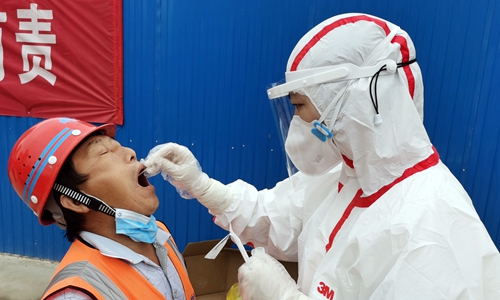NHC lists 8 groups of people for mandatory COVID-19 tests
By Deng Xiaoci Source:Global Times Published: 2020/6/8 15:39:32

A medical worker with the Hanyang district center of disease control takes a throat swab sample for a COVID-19 nucleic acid test from a construction worker in Wuhan, Central China's Hubei Province. The tests will enhance public health security as the city resumes production. Photo: cnsphoto
Overseas returnees and medical workers are among the key groups who should take nucleic acid tests for COVID-19, according to a notice issued by the National Health Commission (NHC) on Monday, amid China's efforts to increase its testing capabilities and expand the scope of testing to consolidate the achievements made in the battle against the epidemic.
Those who have had close contact with confirmed COVID-19 cases, patients at fever clinics and personnel at the border epidemic inspection and control frontline are also included in the updated NHC list.
Patients newly admitted to hospitals and their employers, and staff at prison facilities as well as employees at social welfare institutions and nursing homes for senior citizens, are also among the eight groups of people who should take the tests, the notice said.
The notice said that people outside these categories should take tests on a voluntary basis.
By identifying the new mandatory COVID-19 testing groups, China aims to prevent a large-scale rebound of the disease as such policies focus on dynamic prevention against imported cases and close follow-up of high-risk groups such as those working in correctional facilities and nursing homes for the elderly, said Xue Lan, a professor and former dean at the School of Public Policy and Management at Tsinghua University in Beijing.
"selection of the eight groups of people is remarkably precise and practical, reflecting the government's constant scientific and responsible attitude in the viral fight," said Xue. As a leading emergency response policy advisor, Xue teamed up with Zeng Guang, chief epidemiologist of the Chinese Center for Disease Control and Prevention, to brief national policymakers to cope with the H1N1 outbreak in 2009.
Xue suggested that testing for these eight groups should be carried out on a routine basis, to effectively fend off an epidemic rebound.
The notice stated that local authorities could determine which groups of people to prioritize for testing based on local situations.
The NHC called for the building of laboratories in Class-III hospitals, hospitals specializing in infectious diseases, disease control institutions above the county level, as well as county-level hospitals to enable them to conduct COVID-19 tests.
To lower the cost and improve the efficiency of the tests, agencies are advised to conduct primary tests of mixture of five to 10 samples at a time, said the notice.
Xue emphasized that China's policymaking concerning the diagnosis, treatment and testing for the novel coronavirus has always followed a pragmatic approach and scientific principles, as adjustments were made in a timely way based on the actual situation with prudence and responsibility.
Wuhan, capital of Central China's Hubei Province, the Chinese city once hardest hit by COVID-19, has screened the entire city, completing 9.89 million nucleic acid tests between May 14 and June 1.
No confirmed cases were found, and only 300 asymptomatic patients were found. No cases of asymptomatic persons infecting others have been found.
Xue believes that the chance of large-scale outbreaks caused by local transmission in China is almost zero, and therefore there would be no need to conduct tests for everyone in the country.
"The testing for eight groups as mentioned in the latest NHC notice would sufficiently assure the positive scene is sustained," Xue said.
RELATED ARTICLES:
Posted in: SOCIETY,FEATURE